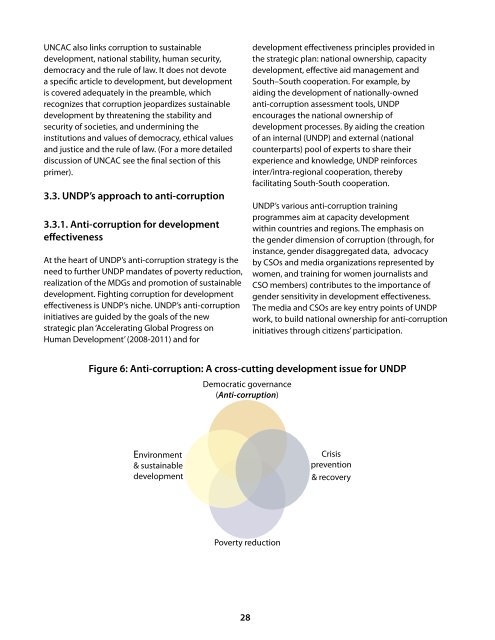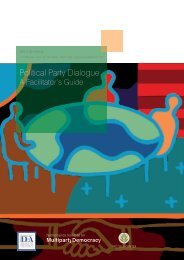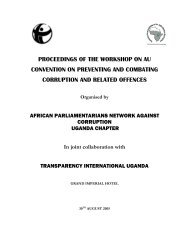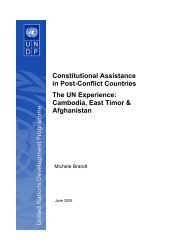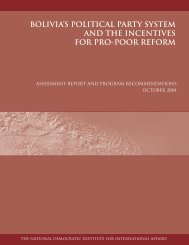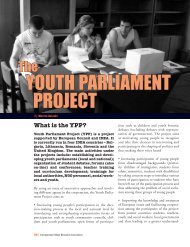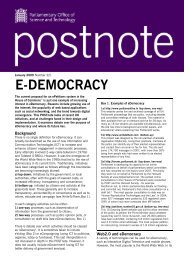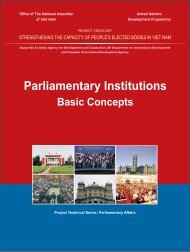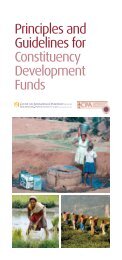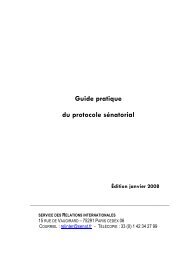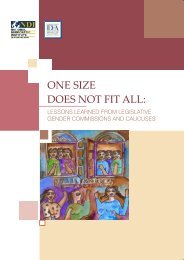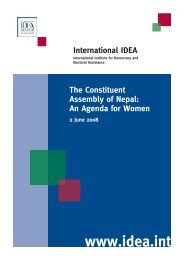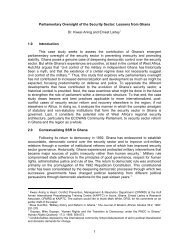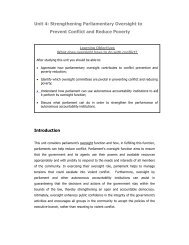Corruption and Development - pogar
Corruption and Development - pogar
Corruption and Development - pogar
You also want an ePaper? Increase the reach of your titles
YUMPU automatically turns print PDFs into web optimized ePapers that Google loves.
UNCAC also links corruption to sustainable<br />
development, national stability, human security,<br />
democracy <strong>and</strong> the rule of law. It does not devote<br />
a specific article to development, but development<br />
is covered adequately in the preamble, which<br />
recognizes that corruption jeopardizes sustainable<br />
development by threatening the stability <strong>and</strong><br />
security of societies, <strong>and</strong> undermining the<br />
institutions <strong>and</strong> values of democracy, ethical values<br />
<strong>and</strong> justice <strong>and</strong> the rule of law. (For a more detailed<br />
discussion of UNCAC see the final section of this<br />
primer).<br />
3.3. UNDP’s approach to anti-corruption<br />
3.3.1. Anti-corruption for development<br />
effectiveness<br />
At the heart of UNDP’s anti-corruption strategy is the<br />
need to further UNDP m<strong>and</strong>ates of poverty reduction,<br />
realization of the MDGs <strong>and</strong> promotion of sustainable<br />
development. Fighting corruption for development<br />
effectiveness is UNDP’s niche. UNDP’s anti-corruption<br />
initiatives are guided by the goals of the new<br />
strategic plan ‘Accelerating Global Progress on<br />
Human <strong>Development</strong>’ (2008-2011) <strong>and</strong> for<br />
development effectiveness principles provided in<br />
the strategic plan: national ownership, capacity<br />
development, effective aid management <strong>and</strong><br />
South–South cooperation. For example, by<br />
aiding the development of nationally-owned<br />
anti-corruption assessment tools, UNDP<br />
encourages the national ownership of<br />
development processes. By aiding the creation<br />
of an internal (UNDP) <strong>and</strong> external (national<br />
counterparts) pool of experts to share their<br />
experience <strong>and</strong> knowledge, UNDP reinforces<br />
inter/intra-regional cooperation, thereby<br />
facilitating South-South cooperation.<br />
UNDP’s various anti-corruption training<br />
programmes aim at capacity development<br />
within countries <strong>and</strong> regions. The emphasis on<br />
the gender dimension of corruption (through, for<br />
instance, gender disaggregated data, advocacy<br />
by CSOs <strong>and</strong> media organizations represented by<br />
women, <strong>and</strong> training for women journalists <strong>and</strong><br />
CSO members) contributes to the importance of<br />
gender sensitivity in development effectiveness.<br />
The media <strong>and</strong> CSOs are key entry points of UNDP<br />
work, to build national ownership for anti-corruption<br />
initiatives through citizens’ participation.<br />
Figure 6: Anti-corruption: A cross-cutting development issue for UNDP<br />
Democratic governance<br />
(Anti-corruption)<br />
Environment<br />
& sustainable<br />
development<br />
Crisis<br />
prevention<br />
& recovery<br />
Poverty reduction<br />
28


